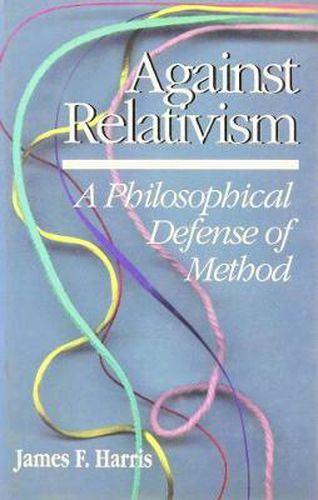Readings Newsletter
Become a Readings Member to make your shopping experience even easier.
Sign in or sign up for free!
You’re not far away from qualifying for FREE standard shipping within Australia
You’ve qualified for FREE standard shipping within Australia
The cart is loading…






Recent decades have witnessed the extraordinary growth of radical relativism, a doctrine which now dominates the entire culture, from popular music to journalism and from religion to school curricula. According to the radical relativist creed, any proposition can be true or false in relation to a chosen framework, the evaluation of fundamental theories or ‘paradigms’ is beyond argument, there are no universal standards of rationality, and, methodologically, ‘Anything goes!’. As James Harris explains in Against Relativism, the new relativism undoes the work of the Enlightenment and inevitably leads to the conclusion that Galileo was wrong to insist that the Earth indeed moves. Succor for relativism has come from many philosophical schools, both Analytic and ‘Continental’. Among the sources of the new relativism are the collapse of Logical Positivism and the shift within anthropology from a linear evolutionary model to numerous models for understanding human culture. In this detailed critique, Professor Harris has selected the strongest and most plausible arguments for relativism within contemporary academic philosophy. He turns the techniques of relativism against relativism itself, showing that it is ultimately self-refuting or otherwise ineffectual. He demonstrates that Quine’s rejection of the analytic-synthetic distinction appeals to the very analytic truths Quine tries to dispel; that Kuhn’s celebrated account of paradigms must be either self-refuting or unintelligible; that Rorty cannot avoid presuppposing the epistemological principles he attacks; and that (although feminist criticisms of science exert a welcome corrective) attempts to develop a distinctively ‘feminist science'are misconceived and unhelpful to feminism. In all these discussions, the author explains the arguments he is criticizing, for the benefit of the non-specialist reader, so that this work can serve as a partisan but fair introduction to some of the most important of present-day philosophy.
$9.00 standard shipping within Australia
FREE standard shipping within Australia for orders over $100.00
Express & International shipping calculated at checkout
Recent decades have witnessed the extraordinary growth of radical relativism, a doctrine which now dominates the entire culture, from popular music to journalism and from religion to school curricula. According to the radical relativist creed, any proposition can be true or false in relation to a chosen framework, the evaluation of fundamental theories or ‘paradigms’ is beyond argument, there are no universal standards of rationality, and, methodologically, ‘Anything goes!’. As James Harris explains in Against Relativism, the new relativism undoes the work of the Enlightenment and inevitably leads to the conclusion that Galileo was wrong to insist that the Earth indeed moves. Succor for relativism has come from many philosophical schools, both Analytic and ‘Continental’. Among the sources of the new relativism are the collapse of Logical Positivism and the shift within anthropology from a linear evolutionary model to numerous models for understanding human culture. In this detailed critique, Professor Harris has selected the strongest and most plausible arguments for relativism within contemporary academic philosophy. He turns the techniques of relativism against relativism itself, showing that it is ultimately self-refuting or otherwise ineffectual. He demonstrates that Quine’s rejection of the analytic-synthetic distinction appeals to the very analytic truths Quine tries to dispel; that Kuhn’s celebrated account of paradigms must be either self-refuting or unintelligible; that Rorty cannot avoid presuppposing the epistemological principles he attacks; and that (although feminist criticisms of science exert a welcome corrective) attempts to develop a distinctively ‘feminist science'are misconceived and unhelpful to feminism. In all these discussions, the author explains the arguments he is criticizing, for the benefit of the non-specialist reader, so that this work can serve as a partisan but fair introduction to some of the most important of present-day philosophy.